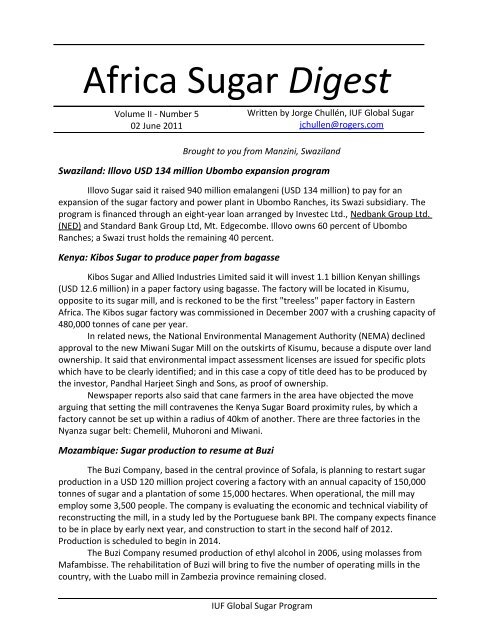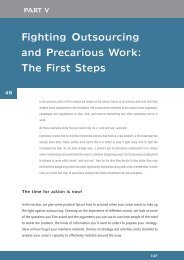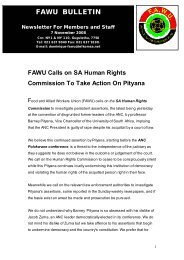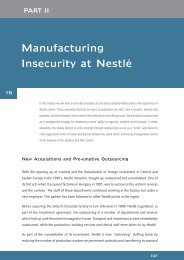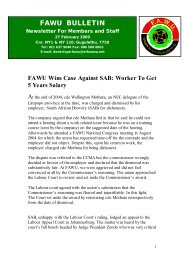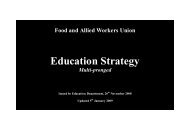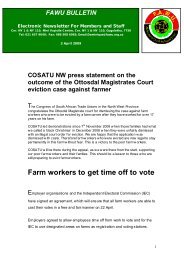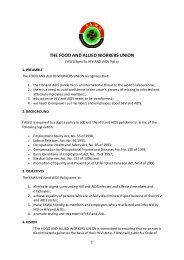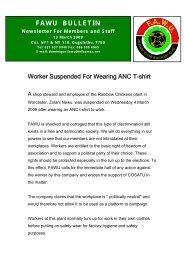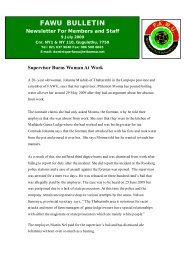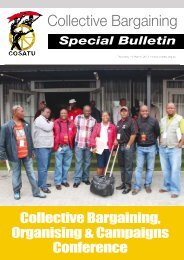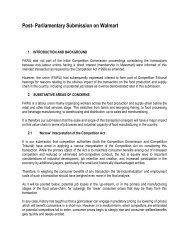Africa Sugar Digest vol2: Number 5 - Food and Allied Workers Union
Africa Sugar Digest vol2: Number 5 - Food and Allied Workers Union
Africa Sugar Digest vol2: Number 5 - Food and Allied Workers Union
Create successful ePaper yourself
Turn your PDF publications into a flip-book with our unique Google optimized e-Paper software.
<strong>Africa</strong> <strong>Sugar</strong> <strong>Digest</strong><br />
Volume II - <strong>Number</strong> 5<br />
02 June 2011<br />
Written by Jorge Chullén, IUF Global <strong>Sugar</strong><br />
jchullen@rogers.com<br />
Brought to you from Manzini, Swazil<strong>and</strong><br />
Swazil<strong>and</strong>: Illovo USD 134 million Ubombo expansion program<br />
Illovo <strong>Sugar</strong> said it raised 940 million emalangeni (USD 134 million) to pay for an<br />
expansion of the sugar factory <strong>and</strong> power plant in Ubombo Ranches, its Swazi subsidiary. The<br />
program is financed through an eight-year loan arranged by Investec Ltd., Nedbank Group Ltd.<br />
(NED) <strong>and</strong> St<strong>and</strong>ard Bank Group Ltd, Mt. Edgecombe. Illovo owns 60 percent of Ubombo<br />
Ranches; a Swazi trust holds the remaining 40 percent.<br />
Kenya: Kibos <strong>Sugar</strong> to produce paper from bagasse<br />
Kibos <strong>Sugar</strong> <strong>and</strong> <strong>Allied</strong> Industries Limited said it will invest 1.1 billion Kenyan shillings<br />
(USD 12.6 million) in a paper factory using bagasse. The factory will be located in Kisumu,<br />
opposite to its sugar mill, <strong>and</strong> is reckoned to be the first "treeless" paper factory in Eastern<br />
<strong>Africa</strong>. The Kibos sugar factory was commissioned in December 2007 with a crushing capacity of<br />
480,000 tonnes of cane per year.<br />
In related news, the National Environmental Management Authority (NEMA) declined<br />
approval to the new Miwani <strong>Sugar</strong> Mill on the outskirts of Kisumu, because a dispute over l<strong>and</strong><br />
ownership. It said that environmental impact assessment licenses are issued for specific plots<br />
which have to be clearly identified; <strong>and</strong> in this case a copy of title deed has to be produced by<br />
the investor, P<strong>and</strong>hal Harjeet Singh <strong>and</strong> Sons, as proof of ownership.<br />
Newspaper reports also said that cane farmers in the area have objected the move<br />
arguing that setting the mill contravenes the Kenya <strong>Sugar</strong> Board proximity rules, by which a<br />
factory cannot be set up within a radius of 40km of another. There are three factories in the<br />
Nyanza sugar belt: Chemelil, Muhoroni <strong>and</strong> Miwani.<br />
Mozambique: <strong>Sugar</strong> production to resume at Buzi<br />
The Buzi Company, based in the central province of Sofala, is planning to restart sugar<br />
production in a USD 120 million project covering a factory with an annual capacity of 150,000<br />
tonnes of sugar <strong>and</strong> a plantation of some 15,000 hectares. When operational, the mill may<br />
employ some 3,500 people. The company is evaluating the economic <strong>and</strong> technical viability of<br />
reconstructing the mill, in a study led by the Portuguese bank BPI. The company expects finance<br />
to be in place by early next year, <strong>and</strong> construction to start in the second half of 2012.<br />
Production is scheduled to begin in 2014.<br />
The Buzi Company resumed production of ethyl alcohol in 2006, using molasses from<br />
Mafambisse. The rehabilitation of Buzi will bring to five the number of operating mills in the<br />
country, with the Luabo mill in Zambezia province remaining closed.<br />
IUF Global <strong>Sugar</strong> Program
02 June 2011 <strong>Africa</strong> <strong>Sugar</strong> <strong>Digest</strong> 2<br />
Mozambique's mills are located in Maragra <strong>and</strong> Xinavane in Maputo province in the<br />
south, <strong>and</strong> Mafambisse <strong>and</strong> Marromeu in Sofala province in the centre of the country.<br />
South <strong>Africa</strong>: Tongaat sees lower profits in 2010<br />
Tongaat Hulett said it expects lower profits to the year ending in March 2011, partly<br />
because of drought in South <strong>Africa</strong>'s cane areas <strong>and</strong> poor growing conditions in Mozambique<br />
during 2010, which led to the company's lowest production in 10 years. Headline earnings per<br />
share are seen about 2.5 percent lower than the previous year. Tongaat has sugar operations in<br />
Mozambique, South <strong>Africa</strong>, Swazil<strong>and</strong> <strong>and</strong> Zimbabwe.<br />
Gabon: Sucaf to double exports<br />
The Societe Sucriere d’Afrique (Sucaf) of Gabon plans to increase production by 6<br />
percent to 30,000 tonnes this year, <strong>and</strong> double its exports to 7,000 tonnes, said a company<br />
spokesperson. Main markets are the Central <strong>Africa</strong>n neighbouring countries like Cameroon,<br />
Equatorial Guinea <strong>and</strong> Sao Tome <strong>and</strong> Principe. Sucaf is reported to run a 10,000 h cane<br />
plantation in the south-eastern town of Ouele, some 700 km from Libreville, capital city.<br />
IUF Global <strong>Sugar</strong> Program: Work with FAWU-South <strong>Africa</strong><br />
Fourteen FAWU sugar shopstewards<br />
met on May 25 & 26 in Durban<br />
for a workshop that reviewed the 2011<br />
wage negotiations <strong>and</strong> drafted a union<br />
strategy to increase membership in the<br />
sector. The workshop also dealt with<br />
FAWU initiatives to improve services to<br />
members, such a medical care scheme;<br />
<strong>and</strong> reviewed the current collective<br />
bargaining agreement reached under the<br />
<strong>Sugar</strong> Bargaining Council.<br />
A representative of the <strong>Sugar</strong><br />
Association of South <strong>Africa</strong> (SASA) gave an<br />
IUF Global <strong>Sugar</strong> /FAWU Workshop, 25-26 May 2011, Durban<br />
overview on national developments <strong>and</strong> sector trends at regional <strong>and</strong> global levels. A delegate<br />
from Mozambique’s SINTIA also attended <strong>and</strong> reported on the sugar wage negotiations.<br />
The workshop was held before negotiations in the South <strong>Africa</strong>n <strong>Sugar</strong> Bargaining<br />
Council which are to resume by June 6. The IUF Global <strong>Sugar</strong> Program <strong>and</strong> FAWU agreed to a<br />
workshop on women workers, with a tentative date of mid July, <strong>and</strong> a meeting on labour<br />
conditions in October.<br />
The workshop is part of the IUF Global <strong>Sugar</strong> project in East <strong>and</strong> Southern <strong>Africa</strong>,<br />
supported by the Social Justice Fund of the Canadian Auto <strong>Workers</strong> (SJF-CAW).<br />
<strong>Africa</strong> <strong>Sugar</strong> <strong>Digest</strong> is produced thanks to the IUF Global <strong>Sugar</strong> project in East <strong>and</strong> Southern <strong>Africa</strong>. It appears as<br />
news becomes available. Contributions are welcome. Visit the IUF sugar site at www.iuf.org/sugar/ for further<br />
information on the cane, sugar <strong>and</strong> ethanol sectors. The IUF <strong>Africa</strong>n sugar project is supported by the Social<br />
Justice Fund of the Canadian Auto <strong>Workers</strong> (SJF-CAW), with contribution from the Canadian International<br />
Development Agency (CIDA).<br />
IUF Global <strong>Sugar</strong> Program


